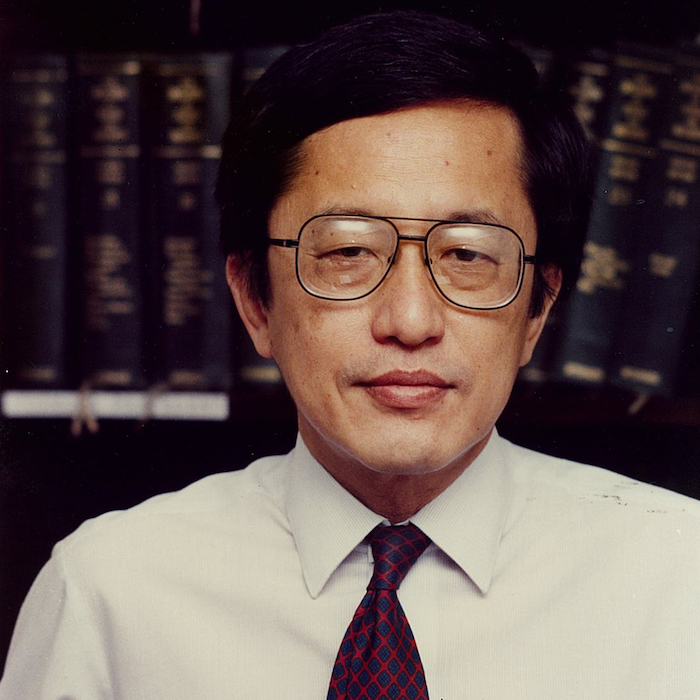Lim Chor Pee (1936 - 2006) was a pioneer in the English-language theatre here in the early ‘60s. He was a playwright, the founder of the Experimental Theatre Club, a theatre theorist and a passionate advocate for the forging of a theatre scene with an authentic Singapore identity and voice. Although he stopped writing after 1964 to practise law and become a famous commercial and corporate litigator, his endeavours in theatre helped to highlight issues of decolonisation and identity in the post-colonial Singapore-Malaya English-language theatre scene. This paved the way for the development of local theatre.
Lim Chor Pee was born in 1936 in Penang, Malaysia. He spent his early years attending the Penang Free School. From 1955 to 1958, he followed in his father's footsteps and studied law at St. John's College, Cambridge University in the UK. In 1959 when Singapore became self-governing, he came to Singapore and joined the Singapore Legal Service where he served as a Crown Counsel and DPP in the A-G's Chambers, as a District Judge, and the first legal adviser to the Tax Department.
While studying at Cambridge, Lim had developed a passion for theatre, and, upon arriving in Singapore, chose to pursue theatre as an interest while embarking on a legal career. In 1961, Lim founded the Experimental Theatre Club (ETC), taking on the roles of playwright and Artistic Director until 1967. With ETC, he wanted to offer Singaporean-Malayan theatre-goers original English language plays that were relevant to them, unlike the prevailing fare of Western drawing room drama.
In the social and political upheaval of the years following Singapore's self-governance and during the height of local anti-colonialism, Lim produced several locally-written plays including two he wrote himself - Mimi Fan (1962) and A White Rose at Midnight (1964). Both featured Singapore-based English-educated, middle-class Malayan characters speaking in a believably authentic lingo of everyday issues relevant to the times. Both were staged by ETC at the then Cultural Centre Theatre at Fort Canning. They received rave reviews in Singapore's English language newspapers for having themes and casts that were local. This was rare at a time when the English language theatre scene was dominated by Western plays acted by expatriate casts.
In 1964, Lim also contributed two articles to Tumasek, a provocative local literary journal set up that year by accomplished local poet and novelist, Dr Goh Poh Seng. The first, titled "Is Drama Non-existent in Singapore?" criticised the theatre scene in Singapore for its limitations, particularly how local plays tended to lean towards the "Western drawing room drama... They just do not concern us", he stated.
The second, "Drama and the University" lambasted local university drama groups for staging Western plays instead of producing plays that were true to their own local identities. Both of Lim's articles were a clarion call to a nation's literati, dramatists, educators and students to stop falling back on colonial influences and references and to champion the authentic Singapore identity.
A year later, Singapore separated from Malaysia and became an independent nation. The ideals expressed in Lim's articles became more pertinent than ever. Lim left the legal service in 1964 to go into private law practice – setting up Chor Pee & Hin Hiong which later became Chor Pee & Partners – and stopped writing plays and articles on theatre. He focused on his legal career for the next 40 or so years and became one of Singapore's most famous commercial and corporate litigation lawyers until his death in December 2006.
However, his call for authenticity in Singapore English-language theatre clearly took root in the tumultuous nation-building years of the early ‘60s and paved the way for the development of the scene and generations of future playwrights. In his introduction to Lim's first play Mimi Fan, distinguished local poet Robert Yeo writes:
He (Lim) had put new wine in old bottles – he had poured Singapore content into a traditional three-act mould in which dialogue was dominant. In the post-colonial situation of the early sixties, that was revolutionary enough… Lim Chor Pee was the first to dream the Singapore play and give it its initial shape.
(Source: Esplanade Offstage)
Photo by Esplanade Offstage
